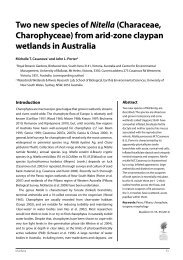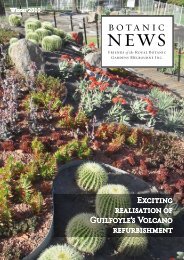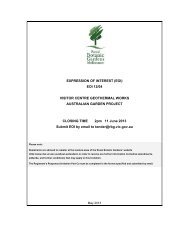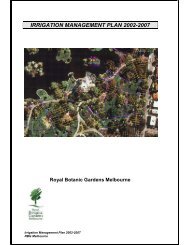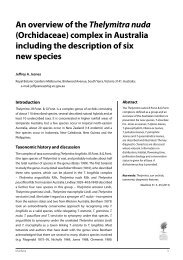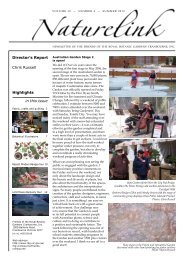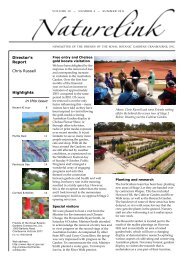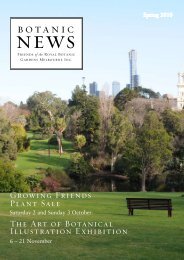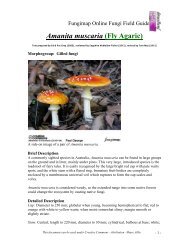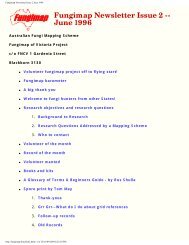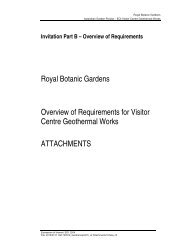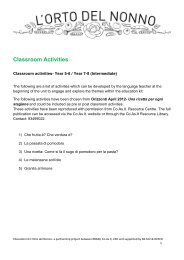Annual Report 2010-2011 (PDF - 2.47 mb) - Royal Botanic Gardens ...
Annual Report 2010-2011 (PDF - 2.47 mb) - Royal Botanic Gardens ...
Annual Report 2010-2011 (PDF - 2.47 mb) - Royal Botanic Gardens ...
Create successful ePaper yourself
Turn your PDF publications into a flip-book with our unique Google optimized e-Paper software.
Contents<br />
appendix<br />
3.6 Confidentiality<br />
The Act requires that the confidentiality of a whistleblower is protected. This is crucial to ensuring reprisals<br />
are not made against a whistleblower. The <strong>Royal</strong> <strong>Botanic</strong> <strong>Gardens</strong> will take all reasonable steps to protect<br />
the identity of the whistleblower.<br />
The Act prohibits the disclosure of information received in relation to a protected disclosure except in certain<br />
limited circumstances. Disclosure of information in breach of section 22 of the Act constitutes an offence<br />
punishable by a maximum fine of 60 penalty units ($7,328.40) or six months imprisonment or both.<br />
The circumstances in which a person may disclose information obtained about a protected disclosure<br />
include:<br />
– where exercising the functions of the public body under the Act;<br />
– when making a report or recommendation under the Act (reports or recommendations must not<br />
disclose particulars likely to identify a whistleblower);<br />
– when publishing statistics in the annual report of a public body; and<br />
– in criminal or disciplinary proceedings for certain offences under the Act.<br />
It is the responsibility of all staff involved in receiving or handling a disclosure, including those who<br />
manage hard copy correspondence, to maintain confidentiality in accordance with the Act. It is also the<br />
responsibility of whistleblowers to keep their disclosure confidential. If the whistleblower repeats the<br />
disclosure to an unauthorised person, he or she will lose the protections that would otherwise be<br />
afforded to them under the Act. For example, if a whistleblower repeats a disclosure to the media, he or<br />
she will not be protected from actions in defamation for any allegations that are reported.<br />
The <strong>Royal</strong> <strong>Botanic</strong> <strong>Gardens</strong> will ensure that all files, whether paper or electronic, are kept in a secure<br />
room and can only be accessed by the Protected Disclosure Co-ordinator, a Protected Disclosure Officer,<br />
the Investigator or the Welfare Manager (in relation to welfare matters). All printed material will be kept in<br />
files that are clearly marked as a Whistleblowers Protection Act matter, and warn of the criminal penalties<br />
that apply to any unauthorised divulging of information concerning a protected disclosure.<br />
All electronic files will be produced and stored on a stand-alone computer and be given password<br />
protection. Backup files will be kept on CD-Rom or floppy disc. All materials relevant to an investigation,<br />
such as tapes from interviews, will also be stored securely with the whistleblower files.<br />
The <strong>Royal</strong> <strong>Botanic</strong> <strong>Gardens</strong> will not email documents relevant to a whistleblower matter and will ensure all<br />
phone calls and meetings are conducted in private. If documents are faxed, they will be sent to a secure<br />
area with the recipient standing by. Additionally, hard copy documents for transmission will be placed<br />
in two successive windowless envelopes which are sealed and marked “private and confidential” and “to<br />
be opened by the addressee only” and personally delivered wherever possible.<br />
3.7 Receiving and Assessing Disclosures<br />
A disclosure must contain the essential elements of a protected disclosure<br />
To be a protected disclosure, it must satisfy the following criteria:<br />
– it is made by a natural person (an individual rather than a corporation);<br />
– it relates to conduct of a public body or public officer acting in their official capacity;<br />
– the alleged conduct is either improper conduct or detrimental action taken against a person in reprisal<br />
for making a protected disclosure; and<br />
– the person making a disclosure has reasonable grounds for believing the alleged conduct has occurred.<br />
page 176



